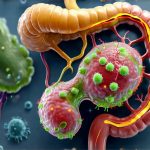The human body is an incredibly complex ecosystem, and increasingly, we are understanding that it’s not just us living within this system, but trillions of microorganisms too. For a long time, these microbes were largely ignored or viewed negatively – as potential pathogens. However, modern research has revealed a far more nuanced picture: many of these microbes are essential for our health and wellbeing, playing vital roles in digestion, immunity, and even mental health. This vast community of bacteria, fungi, viruses, and other microorganisms residing primarily in our digestive tract is collectively known as the gut microbiome.
Understanding this intricate world within us is crucial to appreciating how interconnected our health truly is. It’s not simply about what we eat; it’s about how these tiny organisms interact with our food, our immune system, and each other, shaping our overall health status. This article will delve into the basics of the gut microbiome, its composition, and why it’s so important for maintaining a healthy life.
What is the Gut Microbiome?
The gut microbiome refers to the diverse collection of microorganisms that live in your digestive tract. It’s often described as an ecosystem because of the complex interactions between different microbial species, and between those species and their host – us! The sheer number of microbes within our gut is astonishing; estimates suggest there are trillions of them, outnumbering human cells by a factor of ten to one.
This microbial community isn’t static—its composition can change throughout life based on various factors like diet, lifestyle, genetics, and medication use (particularly antibiotics). Maintaining a diverse and balanced microbiome is generally considered key to optimal health.
Factors Influencing the Gut Microbiome
Numerous aspects of our lives impact the makeup of our gut microbiome. Diet plays perhaps the most significant role; what we eat directly fuels the microbes in our gut. A diet rich in fiber, fruits, and vegetables tends to promote a more diverse and beneficial microbial community, while a diet high in processed foods, sugar, and saturated fats can negatively affect it.
Dietary Influence on Microbial Composition
Different types of food support different kinds of bacteria. Fiber, for example, is fermented by certain gut bacteria, producing short-chain fatty acids (SCFAs) that have numerous health benefits. These SCFAs are vital energy sources for cells in the colon and play a role in reducing inflammation. Conversely, diets lacking fiber may lead to a decrease in these beneficial bacteria and an increase in potentially harmful ones.
The Role of Antibiotics
Antibiotics, while essential for fighting bacterial infections, can have a significant impact on the gut microbiome. They don’t discriminate between “good” and “bad” bacteria, often leading to a reduction in microbial diversity. This disruption can sometimes have short-term consequences like digestive upset, but long-term effects are also being investigated, potentially impacting immune function and overall health.
Lifestyle Factors & Gut Health
Beyond diet and medication, other lifestyle factors influence the microbiome. Stress, sleep patterns, exercise levels, and even geographic location can all play a role. Chronic stress, for example, has been shown to alter gut microbial composition and function, while regular physical activity is often associated with increased diversity. These interconnected factors highlight the complexity of maintaining a healthy gut ecosystem.


















